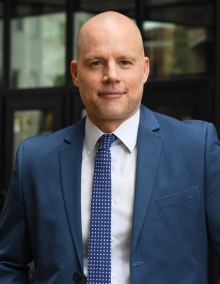A world’s worth of experience

David Coombs, who joined the law school this fall as a lecturer in both the undergraduate and JD programs, knows the power of well-chosen words of advice.
He was a second-year law student at the University of Idaho, where he also did his undergraduate work, and aspired to be a defense lawyer. But at a clinic where he was working, the supervising attorney—a former Marine—said, “I think you’d make a great judge advocate.” Coombs had never even heard of the Judge Advocate General Corps, the military’s well-regarded justice branch. “Everyone I spoke to said it was an amazing opportunity,” he says. “I thought, OK, three years, what’s the harm? I can do that.”
That initial posting became a 21-year career in the Army JAG Corps, where Coombs worked initially as a prosecutor before becoming a defense attorney. His service took him across the United States as well as to Kuwait, Iraq and Italy, before he turned to teaching JAG lawyers in the Army’s training school in Virginia, and a subsequent stint as an Army appellate lawyer. Along the way, he negotiated several high-profile assignments, including one involving Wikileaks whistleblower Chelsea Manning. He retired as a lieutenant colonel.
“My contemporaries who graduated with me were in different jobs they liked, but nobody was traveling the world for their work, on the tip of the spear of issues that were important to our country,” Coombs says. “I really felt fortunate in that.”
Before joining the UB Law faculty, Coombs taught for a dozen years at Roger Williams University School of Law in Bristol, R.I.
In Buffalo, he’s teaching Evidence to second- and third-year law students, a subject he has taught many times. “The rules of evidence are notoriously difficult to understand and apply,” Coombs says. “My goal is to make sure students feel confident when they set foot in a courtroom, that they understand the rules. At the same time, I want the class to be entertaining and something they look forward to. I give plenty of examples, and I challenge them to work through the individual rules.”
Next semester he’ll draw on his JAG Corps experience to teach Military Justice to both undergraduates and law students, as well as Criminal Procedure Investigation. It’s a growth area for the law school, and one that Coombs says is especially timely, because the administration of military justice is changing rapidly. “There have been more changes in the last few years in the military justice system than in the previous 30 or 40 years combined,” he says.
For example, he explains, the military is shifting responsibility for disposition decisions for certain felony level offenses from commanders to trained prosecutors and looking at instituting sentencing guidelines to make punishments more uniform. Moreover, the Uniform Code of Military Justice is a body of law that students might not otherwise encounter, covering offenses such as misbehavior before the enemy, dereliction of duty, maltreatment of a subordinate, and going absent without leave.
At Roger Williams, Coombs also was able to identify students who showed promise and helped place them in JAG Corps positions across the armed services—a career boost he expects to continue at UB Law. “It’s a great thing for the school because its graduates get good jobs that make a difference” he says, “and those graduates also help recruit—they’ll talk to students who are a year or two behind them and say, ‘I love the JAG Corps.’ So, it became easier and easier for me to place students. I’m going to do that here, to try to give UB Law students the opportunity that I had.”